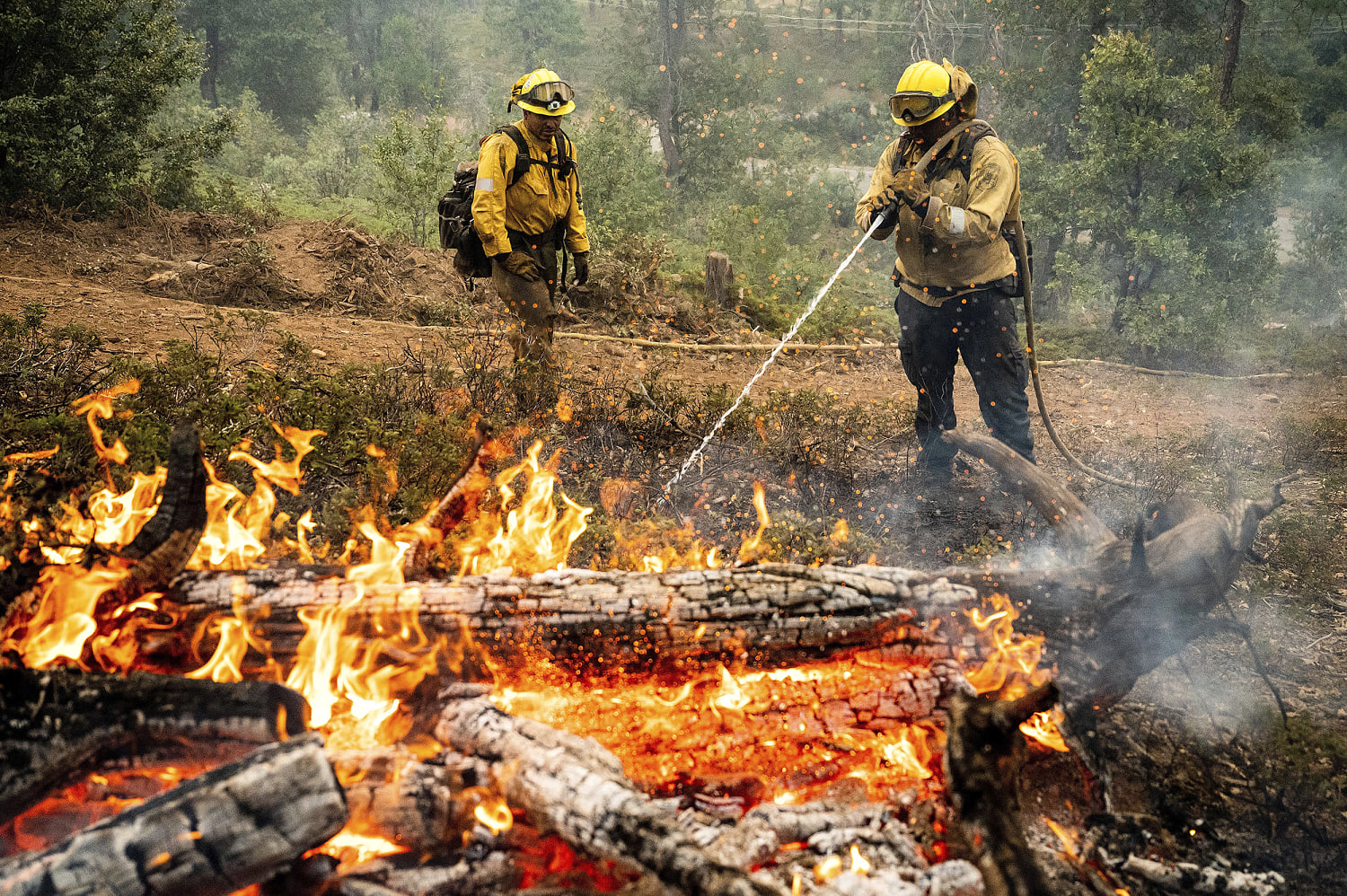Federal firefighters left in limbo as fire season heats up


WASHINGTON — As the first major heat wave of the year swept through the Western U.S. last week, placing the region on high fire alert, dozens of federal fire engines sat unstaffed in the midst of a firefighter exodus.
Across the federal government, wildland firefighters are walking away, frustrated by low pay, lack of support and congressional inaction, according to firefighter advocates.
“Hiring numbers this year are deplorable,” said Riva Duncan, vice president of Grassroots Wildland Firefighters, an organization advocating for federal firefighters. “Agencies are struggling, again, to fill positions in dispatch and on engines, Hotshot crews, helicopters and jump planes”
Firefighters face a Sept. 30 funding deadline, when a $20,000 or 50% retention bonus established by the Infrastructure Investment and Jobs Act in 2021 could expire.
Should the funding expire, starting wages would revert to the federal employee minimum of just $15 an hour, a rate the Government Accountability Office said in a report “does not reflect the risk or physical demands of the work.”
Testifying before the Senate Energy and Natural Resources Committee last year, Jaelith Hall-Rivera, then the deputy chief of the U.S. Forest Service, warned that if the temporary increase is not permanently funded, “we could lose 30% to 50% of our firefighting workforce in the Forest Service. That would be devastating.”
Since then, Congress has left federal wildland firefighters in limbo as the pay increase went down to the wire four times in the last nine months. Each instance was extended through last-minute continuing resolutions, or CRs, passed to avoid government shutdowns.
Once again, a funding deadline looms at the end of the summer for firefighters.
“It’s maddening,” Duncan said. “While it was a big deal for the funding to continue in each CR, the uncertainty was brutal.”
According to the National Federation of Federal Employees, a large public-sector union, over 1,300 Forest Service firefighters were lost to resignations in the last three years, with the outflow only accelerating in the past year. Currently, 84 Forest Service fire engines in California sit unstaffed at any time, 111 are partly staffed, and only 112 are fully staffed seven days a week.
“This is when we’re supposed to really be ramping up,” said the federation’s national land management business representative, Max Alonzo, a former firefighter. “Everybody’s coming in, all the seasonal firefighters are joining, and we still can’t staff all of the engines.”
Agencies are actively recruiting to fill vacancies, but Alonzo said the new recruits lack the years of training and experience of the firefighters who have left. The thin numbers pose risks for firefighters out in the field — “everyone gets overworked, and you lose the people who are watching your back.”
Even an extension of the infrastructure law’s retention bonus is not the same as a codified pay raise. The temporary bonus is not counted as a salary increase, meaning it does not help with future pension disbursements or financial planning. Both Alonzo and Duncan said firefighters are struggling in the meantime with mortgage applications because banks count their base salary, not the temporary pay.
Low pay is the most commonly cited barrier to retention, but federal firefighters also face lengthening fire seasons, poor work life balance, mental health crises and long-term health damage from chemical and smoke exposure that is not covered by the government.
The Biden administration’s budget proposal includes funding for a permanent pay increase, $40 million to increase personnel capacity, $20 million for physical and mental well-being and $5 million for housing. Duncan called the package an “enormous positive step,” but the administration’s similar funding requests last year did not make it into the final funding package.
Bipartisan legislation introduced by Sen. Kyrsten Sinema, I-Ariz., called the Wildland Firefighters Paycheck Protection Act, would permanently fund the pay increase, provide pay for time away from home and improve rest periods. It has co-sponsors from mostly Western-state senators, including Alex Padilla, D-Calif.; Martin Heinrich, D-N.M.; John Barrasso, R-Wyo.; Jon Tester, D-Mont.; and Steve Daines, R-Mont. The bill’s co-sponsors urged immediate action in a letter to Senate Democratic leader Chuck Schumer and Republican leader Mitch McConnell, arguing that letting the infrastructure law’s retention raise expire and the exodus that would ensue would endanger communities and present a national security risk.
The bill passed the Senate Homeland Security and Governmental Affairs Committee in September, but it has stalled, with no plans for a full floor vote. Similar legislation introduced in the House by Joe Neguse, D-Colo., remains in committee.
Advocates hope the bill can break the cycle of uncertainty for firefighters but are cognizant of the uphill climb it faces in Congress.
Much is on the line for firefighters hoping to stay in a career they take pride in and put their lives on the line for, Alonzo said. “They love the work. They love the agencies. But if that money gets pulled back, they can’t survive.”







